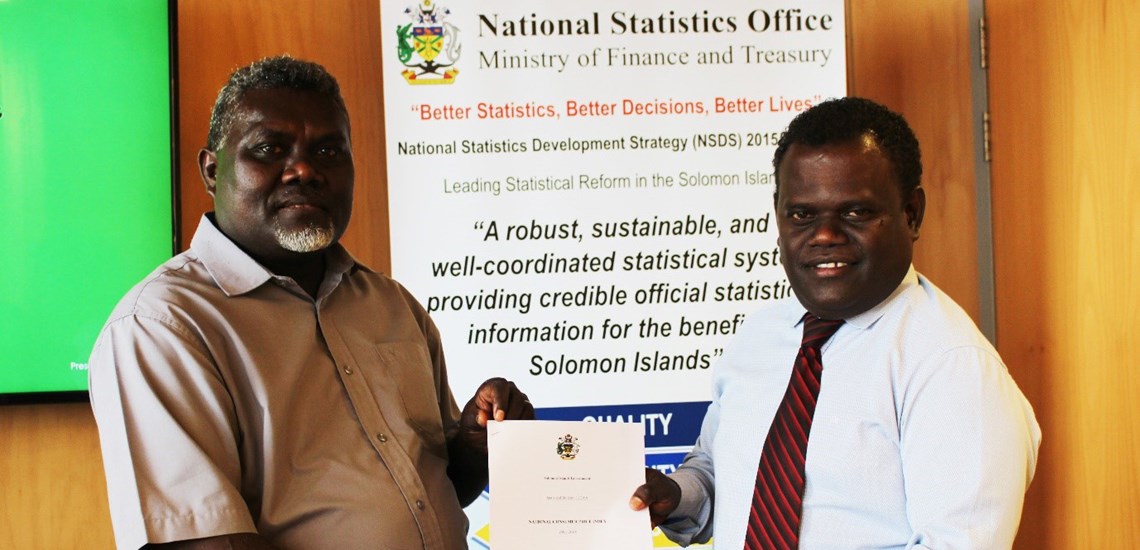
The Solomon Islands Government through its National Statistics Office (NSO) has reached another milestone in its undertaking as it launched the country’s first ever National Consumer Price Index (NCPI) with an aim to help the government undertake sound effective monetary and fiscal policy formulation and decision-making.
The launching took place at the Ministry of Finance and Treasury conference room on Wednesday 20 August 2019.
In a small but significant ceremony, Government Statistician, Douglas Kimi said that the release of this NCPI series introduces for the first time, the Solomon Islands National Consumer Price Index (NCPI), replacing the Honiara CPI publication series.
The national index base period was referenced to 2017=100 and covers the urban areas of Honiara (Guadalcanal Province), Auki (Malaita), Gizo (Western Province) and Noro (Western Province).
Mr. Kimi said the CPI for Honiara - with continuity from the historical series, is produced together with new CPIs for Auki, Gizo and Noro. The National CPI is the weighted average of these four urban areas.
Consumer Price Index (CPI) is a measure of the average change in the price levels of a basket of consumer goods and services purchased by households at a specified time relative to a base year.
The current CPI is referred to as the Solomon Islands CPI given its coverage of Honiara urban, Auki urban, Gizo urban and Noro urban as a representation for the country.
He said that the NCPI as well as the CPIs and inflation measures for the respective local provincial towns are key economic indicators that are able to inform the country’s key monetary and fiscal (budgetary) policies, and inform the general public about the general cost of living in not only in Honiara or the country, but also in the other small provincial towns.
“Apart from the availability of other official price measures, other uses of the CPI include informing decision making about inflation adjusted wage indexation policies."
Mr. Kimi stated that in the absence of accurate or updated CPI data, it would be difficult, for example, for the government to undertake sound effective monetary and fiscal policy formulation and decision-making including its use in various sector policies including research and analysis.
“With the ever increasing demand for statistical information and with immerging global statistical challenges, the NSO will continue to be guided by the National Statistics Development Strategy 2015-16 to 2035 which encompasses the policies of government, to continue efforts to revitalise and reform our country’s national statistical system. In this connection, the NCPI data is a key source of data input for the national statistic system so as to inform policy, planning and decision making,” he said.
Mr. Kimi then thanked stakeholders, development partners including cooperation of all levels of government and the fullest participation of people across the nation and NSO staff would contributed one way or the other towards the success of this NCPI series.
Congratulation the NSO for the landmark achievement, Permanent Secretary for the Ministry of Finance and Treasury McKinnie Dentana said that the launch of the NCPI series is also a fine achievement for the Democratic Coalition Government for Advancement (DCGA) according to its 100 days policy statement.
He said that this NCPI series will not only support the government in its monetary and fiscal policy formulation and decision-making but stakeholders, businesses and everyone will benefit from the information it provided now and in the future.
Meanwhile, PS Dentana said that despite the challenges the NSO is facing, his executive will continue to render support to the office (NSO) to ensure it continue to effectively implement its work programs.
The launching event was attended by PS MoFT, government officials, representative from the Central bank of Solomon Islands, DFAT, MOFT and NSO staff.
Source: SINSO
Solomon Islands Chamber of Commerce & Industry
1st Floor, Suite 213, Hyundai Mall,
Central Honiara,
P.O.Box 650,
Honiara,
Solomon Islands
T: (+677) 39542
T: (+677) 39543
F: (+677) 39544
E: services@solomonchamber.com.sb
